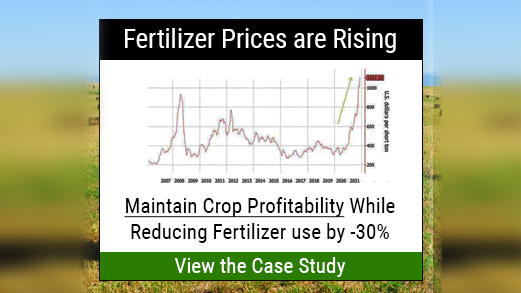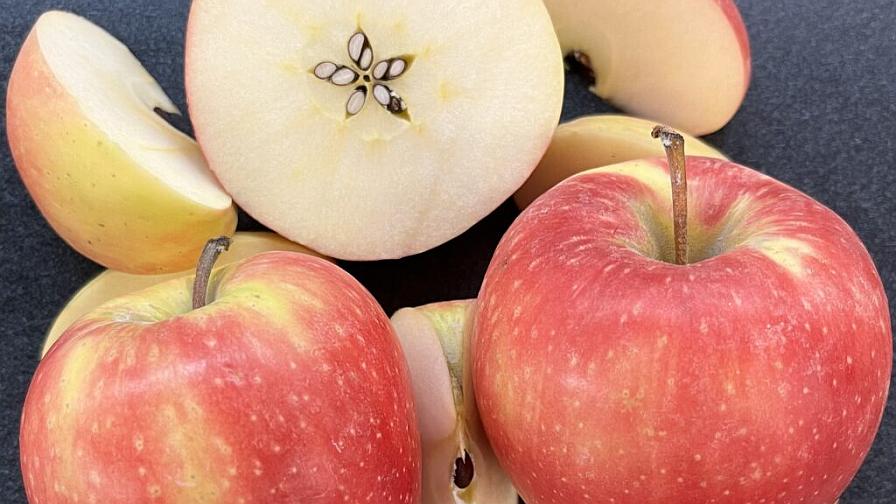McManis Family Vineyards: Treating Employees Like Family
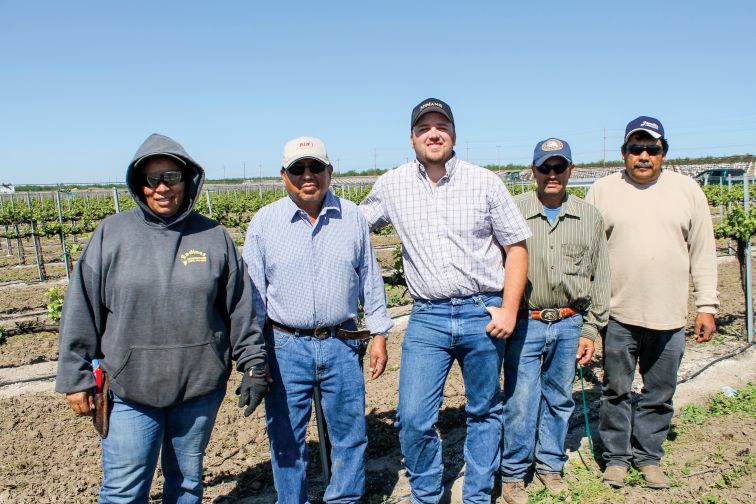
These employees and/or labor contractors at McManis Family Vineyards represent nearly 70 years of experience. (Photo credit: David Eddy)
The recipe for a smooth-running, hugely successful, vertically integrated, award-winning farming operation really isn’t complicated.
You start with a tight-knit family, then bring in employees who share your values. Add a healthy measure of respect and a dash of common sense, and you’ll soon have a good thing going, says Dirk Heuvel, Vineyard Manager at McManis Family Vineyards of Ripon, CA.
“We’re a family operation,” he says, “so it’s important that we recognize our employees have families, too.”
Of course, a lot of growers say they treat their employees like family, but if you don’t come through in tangible ways — and that’s where the rub is, because now you’re talking money — it’s just talk.
Real Benefits
At McManis Family Vineyards, after one year of full-time employment, a person gets full health benefits. The worker also gets a 401(K). Both of these are obviously good for the employees, but they’re good for McManis too, says Heuvel, because the workers can focus on the task at hand.
“They don’t have to worry so much about their health,” he says, “and in the future they have something to lean on.”
Those benefits are probably the biggest reasons just over half the farming operation’s eight full-time employees have been there more than 20 years.
But there are other reasons too, and they tend to have a cascading effect, fomenting camaraderie and peer pressure. For example, after every quarter the operation avoids a safety violation, every employee gets a $50 Visa card. It’s such an effective strategy, Heuvel couldn’t recall the last time bonuses weren’t awarded, so he asked one of his supervisors, who said it had been at least six years.
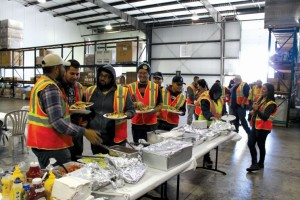
McManis Family Vineyards’ employees enjoy a lunch featuring cheeseburgers with roasted peppers and bacon-wrapped hot dogs — washed down with real Mexican Coca-Cola. (Photo credit: David Eddy)
It doesn’t hurt that they frequently have refresher courses on safety. At least every other month, the company provides coffee and donuts to start the day with a safety class. Speaking of safety, according to state regulations, every worker in the winery has to wear a safety vest. If someone forgets their vest, it’s a much-loved tradition for that person to bring donuts for everybody.
That sort of friendly peer pressure helps relieve the strain caused by the burden of government regulations, which can be quite onerous. Not only that, Heuvel says they can be downright insulting to the employees.
“Our workers are very intelligent, but the state regulations imply they are uninformed and treated unfairly,” he says with disgust. “That’s absolutely not the case; we make sure it’s safe and the benefits are rewarding.”
Extra Rewards
Treating employees well extends to special occasions throughout the year. After every major task in the vineyard is completed, such as pruning, shoot thinning, etc., the workers are treated to a big lunch. The winery workers are treated similarly after a bottling run, filtering, etc.
“We just do it as a thank-you for all their hard work,” Heuvel says with a shrug.
It’s at harvest that McManis really tries to thank all involved. At that time, it’s not just their own employees who are involved, but all the crews brought in by the farm labor contractors to help with harvest. Every Sunday, each shift gets a meal prepared on-site and the winemakers or owners are frequently involved.
But perhaps Heuvel’s favorite gesture McManis does for its employees is one that helps out potential future farmers, too. The company purchases five or six pigs at the State Fair each summer from FFA (Future Farmers of America) students, has the meat processed, and then hands out packages to the employees.
It’s not just the right thing to do; it might be good karma. Soon after Heuvel started with the company in 2009, he recognized the experience and abilities the employees possessed.
Their skill set is diverse, making for a great vineyard management team that Heuvel began leading in 2011. He works closely with Jose Godinez, who has been with the family for 35 years.
“You have to realize he has a lot of experience and expertise farming winegrapes,” he says. “I have taken his old-school experience and combined that with some of my modern approaches,” he says. “He’s been something of a mentor for me.”
SIDEBAR:
McManis At-A-Glance
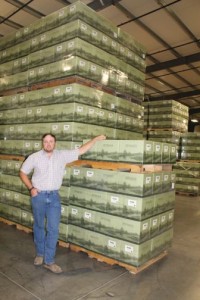
The company’s new bottling line produced 425,000 cases in 2015. (Photo credit: David Eddy)
To say McManis Family Vineyards is spread out is definitely an understatement. They farm a total of 3,000 acres of winegrapes in two general locations. About 1,200 acres are to the south around Ripon, CA, where the winery is located, just north of Modesto, and are spread among seven separate ranches. The other 1,800 acres are located in the Lodi Region, in San Joaquin and Sacramento counties.
“We like being spread out, it spreads the risk, but even more importantly we get different characteristics from different varieties,” says Vineyard Manager Dirk Heuvel. “For example, besides the climate, the soil is different, with more sandy loam in Lodi and primarily fertile river bottom ground in the Ripon area.”
Of the 425,000 cases of wine they bottle annually, they grow most of the grapes.“We still source from other growers because we don’t produce all the grapes we need,” he says.
It’s not that Heuvel minds working with other growers, in fact, he says it can be a win/win situation. For example, in applying for the California Green Medal Business Award (See “Sustainable Leadership”), he acted as an adviser. “We helped them through the sustainability process so we could say our wines are certified sustainable,” he says.
A fifth-generation farming family, the company is led by Ron McManis, the president, who also handles bulk wine sales. His wife, Jamie McManis, is vice president and handles case sales. Their daughter, Tanya McManis, who is office administrator, married Dirk in 2012, three years after he arrived. His brother-in-law, Justin McManis, is the assistant winemaker. To say the company is vertically integrated is putting it mildly.
“We control every aspect of our operation, from the time the vine goes into the ground until the bottle leaves the facility,” Heuvel says.
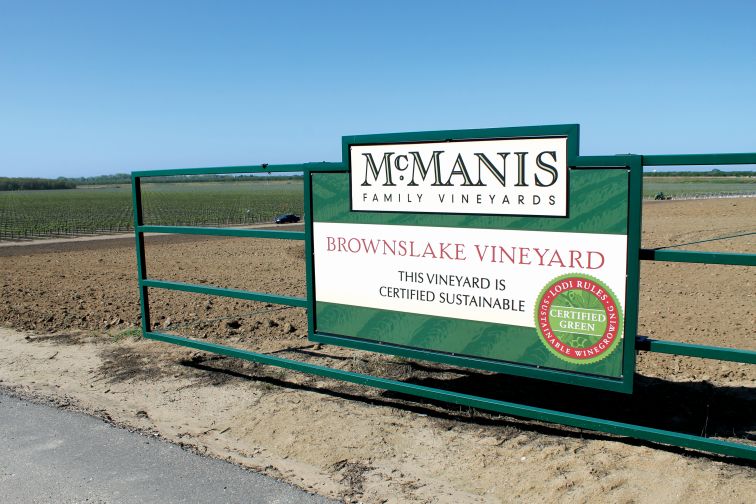
Getting certified sustainable according to the ‘Lodi Rules’ is an arduous process. (Photo credit: David Eddy)
SIDEBAR:
Sustainable Leadership
McManis Family Vineyards will be recognized this year with a tremendous honor, the California Green Medal Business Award.
The California Green Medal was developed by the California Sustainable Winegrowing Alliance, California Association of Winegrape Growers, Lodi Winegrape Commission, Napa Valley Vintners, Vineyard Team, and Wine Institute.
More than a dozen of California’s regional winery and winegrowing association partners also helped to promote the awards, which were selected by a panel of wine and sustainability experts.
This year’s winners, including McManis Family Vineyards, were to be honored at a reception and ceremony in Sacramento April 20th, says Vineyard Manager Dirk Heuvel.
Making sustainability a core part of their business strategy not only benefits the environment and surrounding community, Heuvel says, it has streamlined processes in the vineyard, winery, and office, resulting in economic gains that help ensure a thriving business for future generations.
McManis Family Vineyards has been successful at achieving their vision of sustainably producing wine that delivers on quality, value, and consistency, which is now enjoyed in more than 20 countries worldwide, Heuvel says.
SIDEBAR:
Going Solar
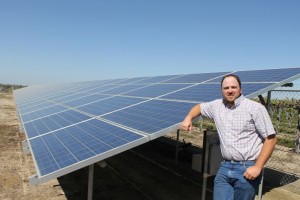
Vineyard Manager Dirk Heuvel says they will consider installing more solar arrays if they pencil out. (Photo credit: David Eddy)
One sustainable enterprise at McManis Family Vineyards involves the three separate solar arrays supplying power to pump stations.
Each system puts out approximately 50,000 kilowatts per year and has a combined total of 340 solar panels, enough to irrigate more than 500 acres, says Vineyard Manager Dirk Heuvel. The first one was installed in 2011.
“Our quest for sustainable certification was really what triggered our decision to start installing solar in the vineyards,” he says.






